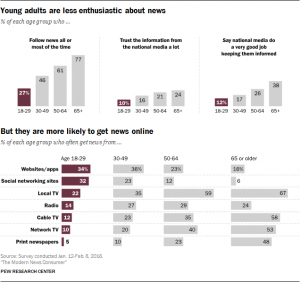Living in the Information Age has provided never before seen ways of getting and staying connected as well as unprecedented challenges to the ways we consume media. More traditional media outlets and the massive cable media machine have been dramatically declining as an endless range of newer online options began to compete intensely for attention in the fast paced 24/7 information consuming landscape. The major reason for this decline has been the lack of trust people have in the media. Only 6% of people have “great confidence” in the press. This has sent more and more people to social media and other online sources to find newer alternatives to get their information, as 87% of people get their news from Facebook.

Everything about the way people consume media has been changing, especially as the younger generations are the ones leading the charge into the online universe. With this change comes the need to reevaluate the standards and ethics that news reporting requires. The old role journalists had as “gatekeepers” is now gone, since the flood of information is so overwhelming and available, there is no way for them to be a gate to it. The must now become “referees” to the information that is out there. Clear and reliable reporting is difficult in the face of the need to go “viral” with the quickest and most up-to-date story that can gain the highest views and be the loudest voice in a crowded bubble. Journalists have a responsibility to democracy however, that these new media habits are dangerous towards. This is why evaluating who is considered a journalist now that everyone has a megaphone into the world is extremely important.
Bias and truth are very important aspects to evaluate as information becomes so widespread and available. There is no single “objective truth,” especially in reporting. Being able to recognize the different ways bias appears is important since every piece of information consumed was created by someone with some kind of intention. Alternative forms of media can provide different sides to the story, giving voices and commentary that is often ignored in the bigger outlets. Bias is not inherently wrong unless there is an intention to deceive or influence with misinformation. Simply providing a point of view perspective could be important to the story as well as defending the facts from sides that simply have a different political motive is a part of the purpose of a journalist. Identifying ethics of new media starts with recognize where the information is coming from and why it exists. In a free democracy and the age of free-flowing information, it is up to us to ensure the information we discover is accurate and understand the context it was created in.
Brian Eckelkamp
